The day before I'm scheduled to speak with Gloria Allred about Seeing Allred, Bill Cosby reappears in the news doing stand-up in Philadelphia. It's a striking coincidence. While the film, directed by Roberta Grossman and Sophie Sartain, covers the breadth of Allred's biography, the backbone of its narrative is her work with women who have accused Cosby of sexual assault, as well as her fight to change statute of limitation laws. When I ask what her reaction to Cosby's reemergence is, Allred tells me that, in her opinion, it "may very well be a public relations strategy" in light of his impending retrial in April: "I think it's hurtful to many of the accusers to see him out there, trying to build his image in order to have an impact on the jury pool."
"I thought to myself, what should I be like? And I decided that I should be strong, that I should show no fear."
Seeing Allred, which premiered at the Sundance Film Festival and is currently available on Netflix, could not come at a better time. When Grossman and Sartain started filming the documentary, the wave of Cosby allegations hadn't happened yet, but since then—well, you know: Trump assumed office after boasting about grabbing women "by the pussy." Harvey Weinstein went down. Basically, everything that Allred's been talking about for years is at the forefront of our national conversation. "Time and time again she seemed to be ahead of her time, so it's really gratifying for us as filmmakers to feel like the world is finally catching up to Gloria," Sartain says.
Grossman and Sartain were editing Seeing Allred throughout 2017, and finishing up the process when the Weinstein allegations broke. They knew they couldn't ignore them. "As soon as we realized that there was this sea change moment in our culture, we kind of just had to scramble," Sartain explains. "We thought, 'We've got to weave this in because Gloria's part of it,' and in a lot of ways it reframed the whole film." They included a passing reference to Allred's daughter Lisa Bloom's initial representation of Weinstein, though Sartain adds that they didn't feel it needed to be "central" to the movie.
But before all of that, it wasn't easy to sell Allred herself on the idea of participating in a documentary about her life. She wanted to make it clear that certain topics relating to her clients would be off limits for legal reasons. And while Allred wanted the women she represents to be given a platform, she was hesitant to open up too much about her own experiences.
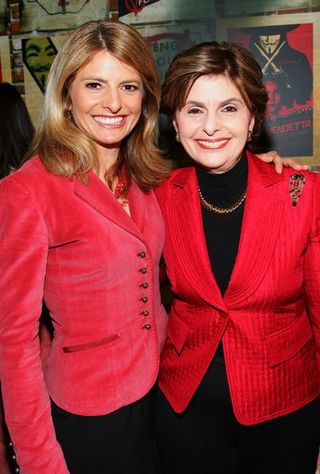
Lisa Bloom and Gloria Allred.
"I really wanted this to be more about the other women, the accusers who are facing their challenges," she says, "but Roberta and Sophie felt that it was important for audiences to understand me. Some people have questions about why I do what I do, and why am I so committed to the cause of improving the status of women, and winning equal rights for women, girls, and minorities. They explained that to me, so I agreed to do the movie to some extent—to the extent that I could. It was a small sacrifice in order to achieve the greater benefit of having other women's challenges and stories told."
During the interview portions of the documentary, Allred answers questions matter-of-factly. She deliberately recounts how she was raped at gunpoint in Mexico when she was in her 20s, and then received a pre-Roe v. Wade abortion that nearly killed her. She's more skeptical when asked about her ex-husband William Allred, who was convicted of fraud. "Wait a second, judge, can you please tell your client that she's being non-responsive?" Grossman, off camera, jokes. Allred smiles and gives in, but still doesn't say much.
"I realized that I wasn't just acting as a fearless attorney, I at some point realized: That's who I am."
Allred is nothing if not calculating, a word I hesitate to use because of how often it's pejorative. But I promise that in this case it's admirable and accurate. Allred is a good lawyer, after all, and she's shaped herself around her mission. "Gloria works night and day, 24 hours a day, and what you see is what you get," Grossman says. "She is a tireless warrior and superhero on behalf of women and civil rights. And that is real, and that's what she's about. So she doesn't want to talk about her personal experiences. Was it frustrating? Yes. But ultimately Gloria's an immovable force—as many men have found out who've been on the wrong side of her."
Stay In The Know
Marie Claire email subscribers get intel on fashion and beauty trends, hot-off-the-press celebrity news, and more. Sign up here.
Gloria herself invented this unflappable public persona, and the way she describes her fearlessness makes it sound like a radical act. In the documentary, she breaks down her thought process after press started asking her to speak as a women's rights attorney: "I thought to myself, what should I be like? And I decided that I should be strong, that I should show no fear."
I asked her to elaborate on that: "I decided it was important to be fearless, and people needed to know that I have a passion for justice, this is my path, and we need to speak truth to power. In order to speak truth to power we need to be fearless," she says, adding that while boldness is in her blood, she never thought of herself in that way initially.
"It wasn't that hard because I think I don't have the fear gene in my body and neither did my mother. I don't think my daughter has it, nor does my granddaughter have it. My granddaughter's also an attorney. And then I realized that I wasn't just acting as a fearless attorney, I at some point realized: That's who I am."
Watch Seeing Allred right this way.
RELATED STORY

-
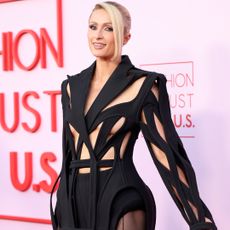 Paris Hilton Is Finally Ready to Share Her Daughter With the World
Paris Hilton Is Finally Ready to Share Her Daughter With the WorldHilton shared why she chose the name London, who her daughter resembles, and the special significance behind her birthdate.
By Fleurine Tideman Published
-
 Kim Kardashian Confirms to Jimmy Kimmel Whether the Weirdest Rumors About Her Are True or Not
Kim Kardashian Confirms to Jimmy Kimmel Whether the Weirdest Rumors About Her Are True or NotEmphasis on the WEIRDEST rumors.
By Fleurine Tideman Published
-
 Cute Summer Outfits From the Runways With Real-Life Appeal
Cute Summer Outfits From the Runways With Real-Life AppealFrom beach bumming to al fresco dining.
By Emma Childs Published
-
 The Unstoppable Alia Bhatt
The Unstoppable Alia BhattBollywood’s silver-screen darling is both at the top of her game and just getting started.
By Neha Prakash Published
-
 The 30 Best Movies on Hulu Right Now
The 30 Best Movies on Hulu Right NowFrom 'Fight Club' to '10 Things I Hate About You.'
By Brooke Knappenberger Published
-
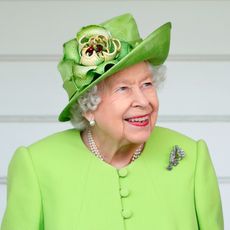 Queen Elizabeth Has Passed Away at 96
Queen Elizabeth Has Passed Away at 96After a 70-year reign, the queen passed away at her home in Balmoral, Scotland.
By Jenny Hollander Published
-
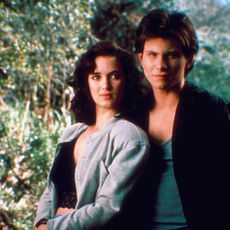 The 50 Best '80s Movies
The 50 Best '80s MoviesAn official roundup of the decade's standout films.
By Quinci LeGardye Last updated
-
 Elizabeth Lail and Dustin Milligan Compete in 'How Well Do You Know Your Co-Star?'
Elizabeth Lail and Dustin Milligan Compete in 'How Well Do You Know Your Co-Star?'The stars of 'Mack & Rita' could barely hold it together during a round of trivia.
By Brooke Knappenberger Published
-
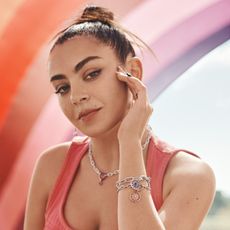 Charli XCX Isn't Here to Appease Anyone
Charli XCX Isn't Here to Appease AnyoneThe pop star talks authenticity, her new album, and taking care of herself while on tour.
By Gabrielle Ulubay Published
-
 What 'Femininity' Means in 2022
What 'Femininity' Means in 2022Malala, Amanda Gorman, Priyanka Chopra Jonas, and more define the word on their own terms.
By Neha Prakash Published
-
 Gossiping With DeuxMoi, the Internet's Lady Whistledown
Gossiping With DeuxMoi, the Internet's Lady WhistledownThe woman behind social media's "Society Papers" dishes on being the keeper of Hollywood's secrets and names her Diamond of the Season.
By Neha Prakash Published
![Seeing Allred | Official Trailer [HD] | Netflix - YouTube](https://img.youtube.com/vi/SC8Eg0odTfY/maxresdefault.jpg)